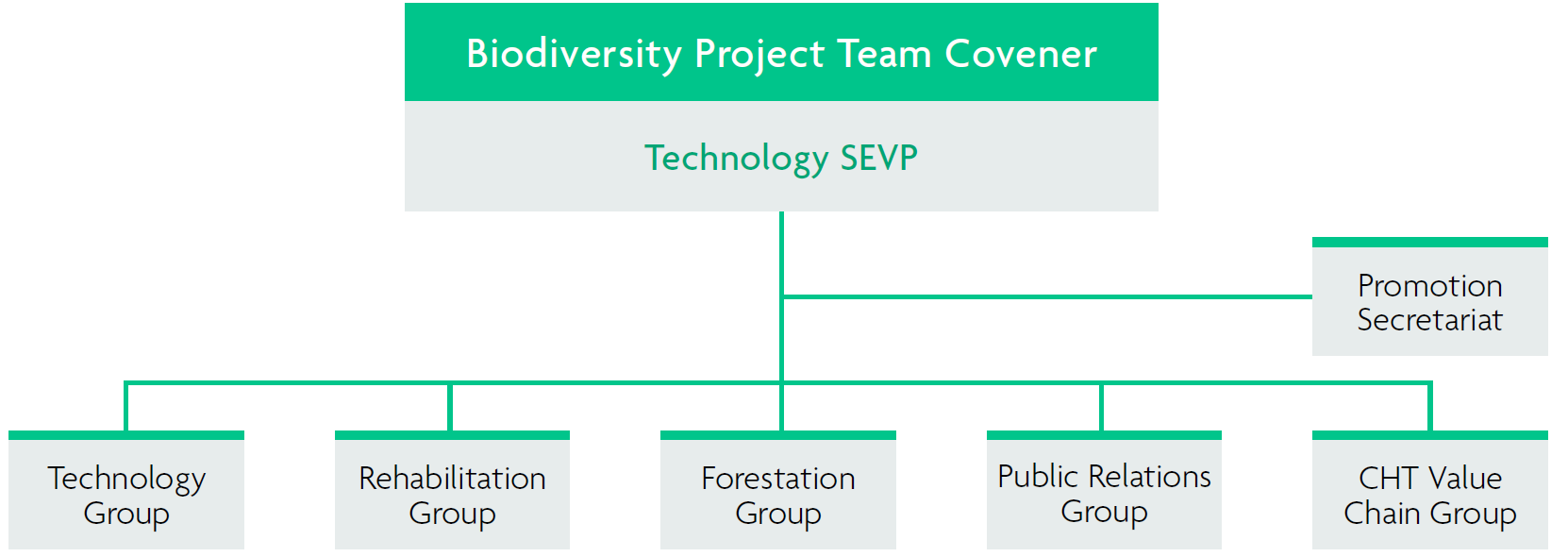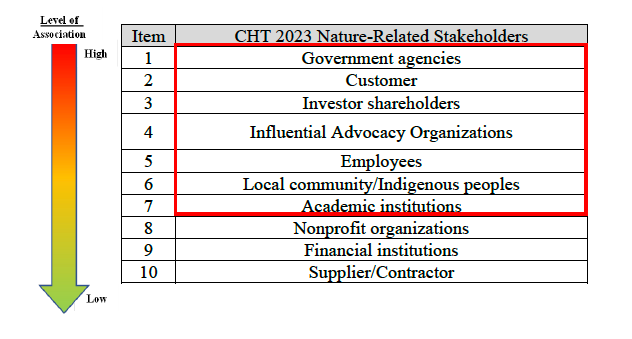Taskforce on Nature-related Financial Disclosures
At the Fifteenth meeting of the Conference of the Parties to the Convention on Biological Diversity (COP15), the United Nations finalized the Kunming-Montreal Global Biodiversity Framework, which includes 23 specific action targets and defines the vision to achieve 30 X 30 biodiversity target by 2030. In particular, Target 15 specifically requires businesses to regularly monitor, assess, and disclose their risks, dependencies, and impacts on biodiversity; it further advocates for sustainable consumption patterns with the aim of gradually reducing negative impacts on biodiversity.
To further implement the aforementioned biodiversity framework action goals, we have adopted the official framework issued by the Taskforce on Nature-related Financial Disclosures (TNFD). In alignment with the four main pillars of governance, strategy, risk and impact management, and metrics and targets, we disclose nature-related information and employ the recommended LEAP (Locate, Evaluate, Assess and Prepare) methodology to systematically analyze Chunghwa Telecom's dependencies and impacts on nature. Additionally, we reference international recognized standards such as the GRI Standards for biodiversity analysis. We aim to proactively mitigate nature-related risks with accountability, enhance corporate resilience in collaboration with affiliated companies, and collectively contribute to achieving a Nature Positive future.
Governance Organizational Structure
The Sustainable Development and Strategy Committee is the highest governing body for CHT's sustainable development. It operates under the Board of Directors as a functional committee, with a convener elected by and among the members. The committee comprises five to nine directors and is primarily responsible for providing strategic guidance on CHT's vision for sustainable development, medium to long-term goals, long-term policies, and management principles. Through quarterly meetings, the committee regularly oversees and evaluates how effectively CHT's initiatives regarding climate change have been implemented, as well as nature-related risks and opportunities. In addition, the Sustainable Development Committee, consisting of management personnel, has been established to uphold CHT's sustainable development strategy and advance various sustainable action plans. It regularly reports on the implementation results and future plans to the Board of Directors, aiding in policy formulation and enhancing the efficiency of sustainable risk management.
As a result, to enhance biodiversity management, CHT has put forward a governance framework for addressing biodiversity issues, led by the Senior Executive Vice President of Technology as the convener, and is supported by task forces focusing on technology, restoration, forestation, public relations, and other related areas. These groups are dedicated to executing projects focused on nature-related dependencies, impacts, risks, and opportunities; in particular, activities include habitat restoration, tree planting, promoting industry-academic cooperation, and keeping abreast of sustainable natural development trends and international initiatives.

Stakeholder Communication and Engagement
CHT adopts the official version of TNFD recommendations to include nature-related stakeholders in the overall assessment process and management. In addition to including relevant factors in the LEAP analysis process, we have also organized workshops on significant natural stakeholders, engaging various departmental teams in discussions to identify stakeholders related to interactions with nature in Chunghwa Telecom's operational activities.
The process for identifying major stakeholders is as follows:
- Referencing international nature-related trends and the official recommendations of TNFD to compile a list of stakeholders associated with CHT's natural environment.
-
Assessing stakeholders according to the principles of responsibility, influence, and diversity of perspectives stipulated in the AA1000 SES Stakeholder Engagement Standard; each department evaluates stakeholders based on their relationship and level of impact; relevant assessment details are provided in the table below.
Evaluation Dimension Definition Responsibility Departments are responsible for protecting the natural environment, preventing biodiversity loss, and safeguarding the rights and interests of stakeholders’ habitats or residential environments Impact Stakeholders who have an impact on nature-related influence of the departments or their decision-making Perspective diversity Diverse opinions of stakeholders benefit the departments by allowing them to gain new insights into special situations or discover new opportunities - Consolidating and statistically standardizing the assessment results from each department and identifying a list of CHT's nature-related stakeholders and the degree of their relationship with the Company.
- Based on criteria such as closeness, significance, and degree of impact on nature-related stakeholders, CHT has selected the top two-thirds, resulting in seven categories of nature-related stakeholders identified as the Company's major nature-related stakeholders.

Chunghwa Telecom believes that valuing and understanding the opinions of stakeholders regarding the Company's operational management issues, engaging in communication, and reaching consensus are the cornerstone of achieving corporate sustainability. The role that stakeholders play in our nature-related initiatives, and the ways in which we incorporate their feedback into our "Strategy" and "Nature-related Risk and Impact Management," are detailed in the Chunghwa Telecom 2024 Taskforce on Nature-Related Financial Disclosures (TNFD) Report.
Biodiversity Conservation Strategies and Objectives
Considering the diverse natural risks faced by Chunghwa Telecom and its value chain, which include both physical and transitional risks, the Company adopts a comprehensive, phased approach to managing nature-related risks and opportunities. Our strategy is anchored around two core objectives: "Mitigating Nature Loss" and "Promoting Nature-Positive Outcomes." Corresponding action plans have been developed with objectives including scientific natural assessments, the establishment of a no-deforestation policy, and alignment with nature-positive initiatives. In addition, we are formulating performance indicators to monitor and track the outcomes of these actions, ensuring effective implementation of our nature-related commitments.
Documents
-
 Chunghwa Telecom Co., Ltd. 2024 TNFD Report
Chunghwa Telecom Co., Ltd. 2024 TNFD Report


